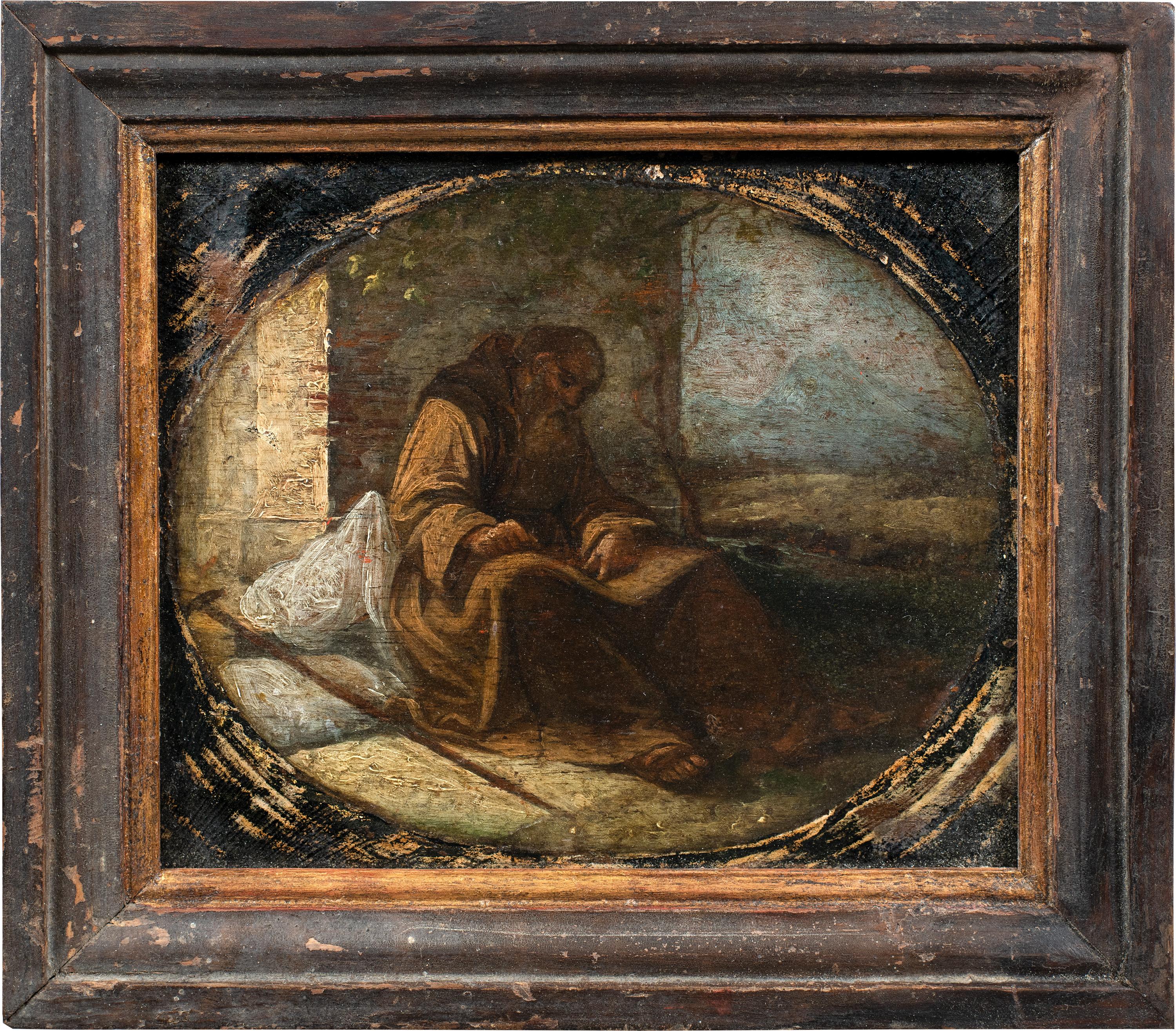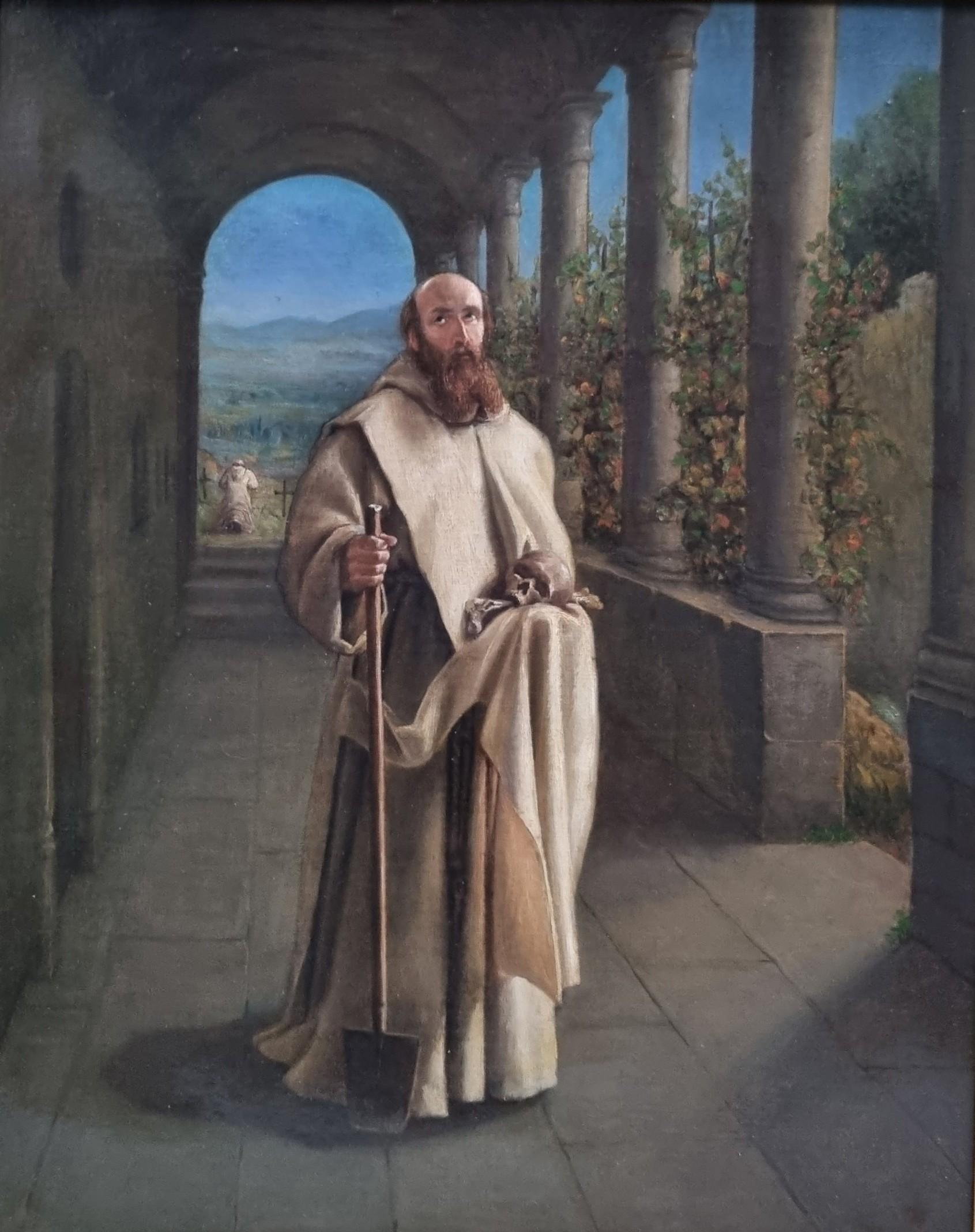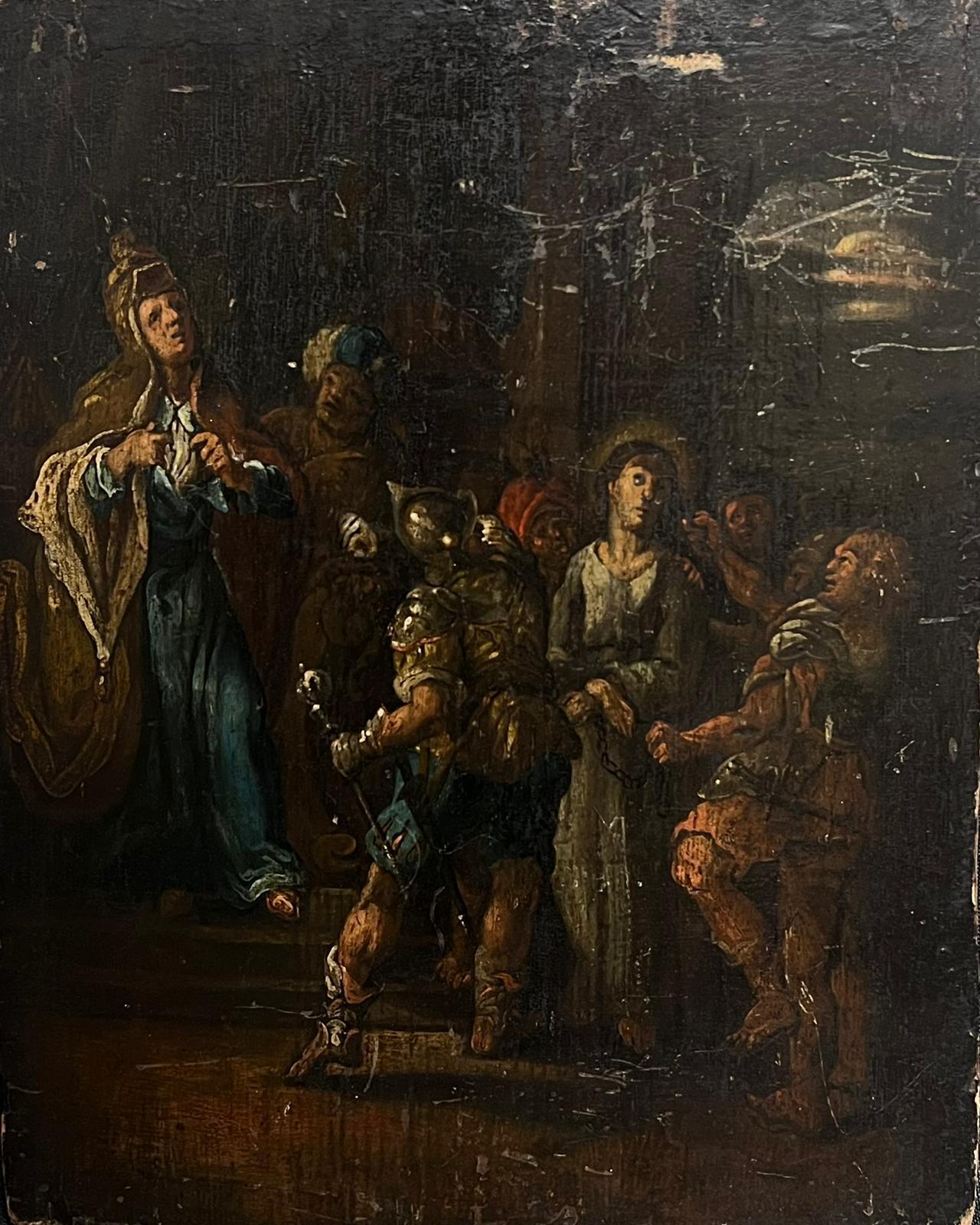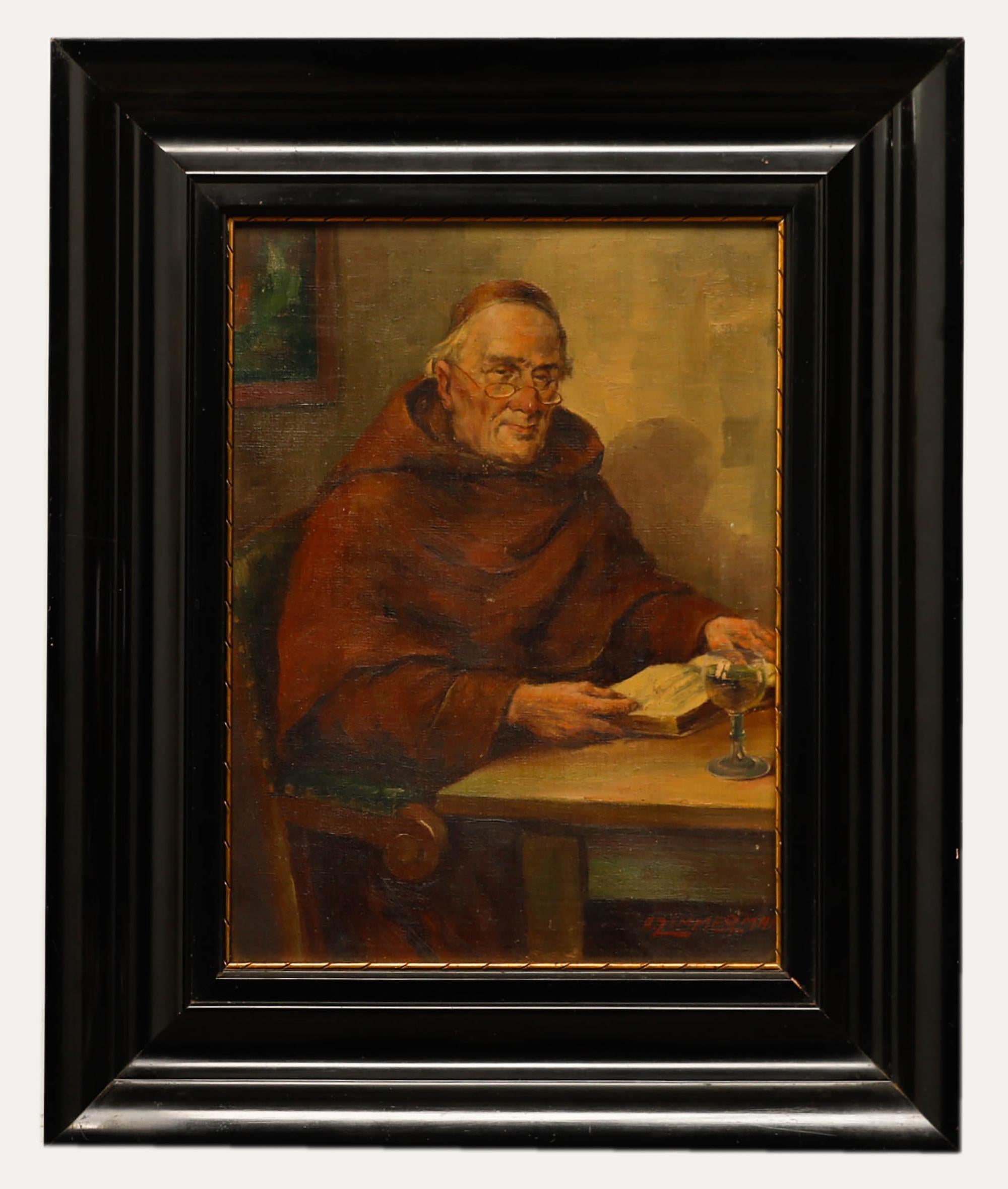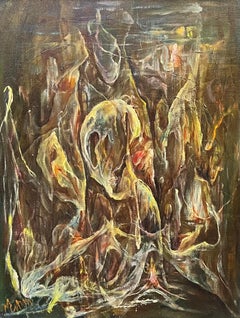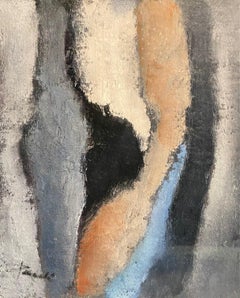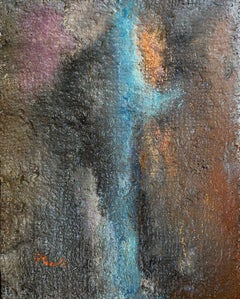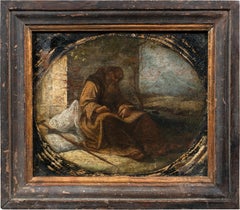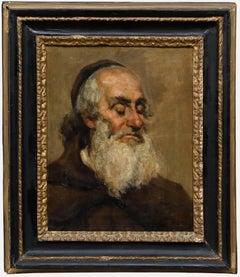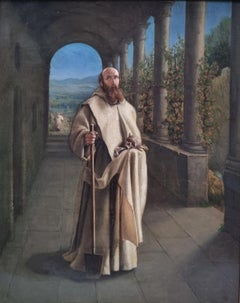Items Similar to Portrait of a monk att. to Pieter Leermans - Oil on canvas 21x40 cm
Want more images or videos?
Request additional images or videos from the seller
1 of 9
Portrait of a monk att. to Pieter Leermans - Oil on canvas 21x40 cm
$2,152
$8,00073% Off
£1,641.87
£6,103.6173% Off
€1,877.58
€6,979.8473% Off
CA$3,032.63
CA$11,273.7173% Off
A$3,306.76
A$12,292.7773% Off
CHF 1,754.86
CHF 6,523.6573% Off
MX$39,977.60
MX$148,615.6273% Off
NOK 22,209.05
NOK 82,561.5373% Off
SEK 20,357.69
SEK 75,679.1373% Off
DKK 14,023.57
DKK 52,132.2473% Off
About the Item
Oil work on canvas sold with frame.
Total size with frame: 58x39x5 cm
- Attributed to:Pieter Leermans (1655 - 1706, Holland)
- Dimensions:Height: 15.75 in (40 cm)Width: 8.27 in (21 cm)Depth: 0.79 in (2 cm)
- Medium:
- Movement & Style:
- Period:Late 17th Century
- Condition:Only one point of restoration on the pictorial crust. No damage on the canvas Tree points of restoration on the frame Good general conditions.
- Gallery Location:Geneva, CH
- Reference Number:1stDibs: LU1434210594602
About the Seller
4.9
Platinum Seller
Premium sellers with a 4.7+ rating and 24-hour response times
Established in 2016
1stDibs seller since 2020
299 sales on 1stDibs
Typical response time: 1 hour
- ShippingRetrieving quote...Shipping from: Geneva, Switzerland
- Return Policy
More From This Seller
View AllBearded man by William Goliasch - Oil on canvas
By William Goliasch
Located in Geneva, CH
Work on canvas
Gilded wood frame
41 x 30,2 x 2,5 cm
Category
Late 20th Century Modern Portrait Paintings
Materials
Oil
$696 Sale Price
63% Off
Abstract Composition N°5 by Vivaldo Martini - Oil on canvas 55x42 cm
By Vivaldo Martini
Located in Geneva, CH
His first name sounds like a concerto. Vivacious, its name is reminiscent of an aperitif or a cyclist. The addition of the two evokes the Italianate. Indomitable and unavoidable. Mor...
Category
Mid-20th Century Baroque Abstract Paintings
Materials
Canvas, Oil
"Comprendre" by Gilbert Pauli - Oil on canvas 19x23 cm
By Gilbert Pauli
Located in Geneva, CH
The work is framed with two plexiglas plates, total size with frame: 33x38x5 cm
Born in the canton of Friborg, Gilbert Pauli (1944 - 2020) lived in Geneva, where he devoted himself...
Category
Early 2000s Abstract Abstract Paintings
Materials
Oil
$552 Sale Price
20% Off
"Porter" by Gilbert Pauli - Oil on canvas 37x30 cm
By Gilbert Pauli
Located in Geneva, CH
Work framed with a C-us box
Excellent state
Category
Early 2000s Abstract Abstract Paintings
Materials
Oil
$480 Sale Price
20% Off
"Mimer" by Gilbert Pauli - Oil on canvas 19x23 cm
By Gilbert Pauli
Located in Geneva, CH
The work is framed with two plexiglas plates, total size with frame: 33x38x5 cm
Born in the canton of Friborg, Gilbert Pauli (1944 - 2020) lived in Geneva, where he devoted himself...
Category
Early 2000s Abstract Abstract Paintings
Materials
Oil
$552 Sale Price
20% Off
Weightlifter by Vivaldo Martini - Oil on canvas 50x60 cm
By Vivaldo Martini
Located in Geneva, CH
His first name sounds like a concerto. Vivacious, its name is reminiscent of an aperitif or a cyclist. The addition of the two evokes the Italianate. Indomitable and unavoidable. Mor...
Category
Mid-20th Century Baroque Portrait Paintings
Materials
Canvas, Oil
You May Also Like
Baroque Italian painter - 17/18th century figure painting - Franciscan friar
Located in Varmo, IT
Italian painter (17th-18th century) - Franciscan pilgrim friar sitting writing (preparatory sketch).
14 x 16.5 cm without frame, 19 x 21.5 cm with frame.
Antique oil painting on pa...
Category
Late 17th Century Baroque Figurative Paintings
Materials
Oil, Panel
$953 Sale Price
33% Off
Free Shipping
1886 Oil - Portrait of a Monk
Located in Corsham, GB
This accomplished nineteenth-century portrait depicts a monk with his eyes closed in prayer. Dated and indistinctly signed to the lower right. Presented in a vintage black frame with...
Category
Late 19th Century Portrait Paintings
Materials
Oil
French Troubadour Religious Painting Monks Relics 19th
Located in PARIS, FR
French school of the 19th century
Monks excavate and find ancient relics
Oil on canvas56 x 46.5 cm (68 x 57.5 cm with the frame)
Beautiful period frame in gilded wood
Good condition ...
Category
Mid-19th Century Romantic Figurative Paintings
Materials
Oil
"Saint with icons"
Located in Edinburgh, GB
Unidentified French Artist (in the Manner of 17th Century Masters)
"Saint with Icons"
Medium: Oil on canvas
Dimensions (Framed): 130 x 164 cm
Dimensions (Canvas): 114 x 149 cm
No sig...
Category
17th Century Realist Figurative Paintings
Materials
Canvas, Oil
Fine Quality 17th Century Dutch Old Master Oil on Wood Panel Trial of Christ
Located in Cirencester, Gloucestershire
The Trial of Christ
Dutch Old Master, 17th century
oil on panel, unframed
panel: 11 x 7.5 inches
provenance: private collection, England,
Christies auction stencil marks verso
condi...
Category
17th Century Baroque Portrait Paintings
Materials
Oil, Wood Panel
A. Zimmerman - 19th Century Oil, The Monk
Located in Corsham, GB
Signed to the lower right. Presented in a black lacquer frame. On canvas.
Category
19th Century Portrait Paintings
Materials
Oil
$437 Sale Price
20% Off
More Ways To Browse
Oil Painting Monk
Oil Painting Of Monks
Oil On Panel Portrait
Child Antique Portraits
Period Portraits
17th Century Dutch Portrait Oil Paintings
Lady In Red
Paintings With Hats
19th Century Oil Portrait Child
19th Century Oil Portraits Of Children
Gold Portrait Frame
Warhol Acrylic
1900 Portrait Of A Woman Oil
Full Length Portrait Oil Painting
Portrait Beautiful Woman
Portrait Painting Man In Suit
Oil Portrait Young Girl
Oil Painting Of Victorian Lady
